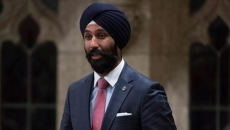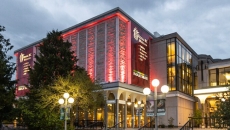KIGALI, RWANDA - Prime Minister Justin Trudeau paid his respects to victims of the 1994 Rwandan genocide in Kigali before announcing $250 million in new food aid on Thursday as he sought to build consensus with Commonwealth nations to prevent a new humanitarian crisis.
The prime minister is in Rwanda for a meeting of Commonwealth heads of government, where he hopes to rally support for Ukraine in its fight against the Russian invasion, and provide assistance to combat the geopolitical fallout of the conflict.
The Commonwealth is made up of 54 independent countries with historic ties to the British Crown, which together represent about 2.5 billion people. The countries range from some of the richest economies in the world to some of the poorest.
Trudeau became the first Canadian prime minister to visit the Kigali Genocide Memorial, which serves as the final resting place of more than 250,000 of the more than 800,000 Rwandans killed over 100 days during the conflict.
The prime minister laid a wreath at one of the tombs and crossed himself as members of the Rwandan military stood guard and played a sombre melody on the bugle horn.
A few hours after his visit to the memorial, Trudeau made a point of blaming Russia for the skyrocketing energy and food prices that have left millions of people in Africa and other parts of the world struggling to feed themselves.
Several of the poorer countries in the Commonwealth have felt the pangs of famine that's becoming a pressing issue around the world as access to grain from Ukraine and Russia has been limited by the war.
Yet 10 of those countries abstained from a UN vote in March condemning Russia’s attack, and Trudeau sought to leverage the difficulty they are now facing in feeding their populations to boost international opposition to Moscow.
"Russia is responsible for the global food crisis we're facing right now," he said during a news conference in which he announced Canada will be contributing an additional $250 million to the World Food Program.
"The illegal invasion of Ukraine, the choice to bomb grain silos in Ukraine over the past couple of days, the continued blockade of the port of Odessa by Russian ships to prevent grain from getting out to the Middle East to Africa to elsewhere around the world, are real preoccupations for all of us here."
The new Canadian funding is on top of roughly $500 million that Canada has already donated since January to help address food insecurity in the developing world.
Yet even as Trudeau sought to find more allies in the Commonwealth for opposing Russia’s invasion, he also faced questions about his plans for raising concerns about the actions of some of its members — starting with host Rwanda.
Human rights groups have been raising concerns about human rights violations in Rwanda under President Paul Kagame for years. Those concerns have included the arrest and prosecution of opposition figures and dissenting bloggers and commentators.
Trudeau and Kagame, whose country was among those that abstained from the UN vote on Russia, attended a roundtable discussion on Thursday to discuss the impact of COVID-19 on businesses and plans to reinvigorate the global economy.
But while the two were supposed to have a one-on-one meeting on Thursday, it was delayed.
Asked what he plans to say about Rwanda’s human rights record when he meets with Kagame, who has been in power since 2000, Trudeau suggested his focus would be on looking for ways in which Canada can help the country.
“We're there to support each other and there to move the bar forward on human rights,” he said. “We will, of course, take careful looks in every conversation at the challenges facing various countries and look for ways that Canada can help.”
This is the first time Commonwealth Heads of Government have met in person since 2018. The 2020 summit, like most events, was postponed because of the COVID-19 pandemic.
Trudeau arrived in Kigali on Wednesday but the official welcome ceremony begins Friday. Leaders are expected to sit down for a series of closed-door meetings Friday and Saturday.
Though many world leaders, including British Prime Minister Boris Johnson, are expected to be in attendance for the summit discussions, other leaders have opted to stay home.
New Zealand Prime Minister Jacinda Ardern and new Australian Prime Minister Anthony Albanese are among the absentees.
Rwanda is the first stop in a three-country tour for Trudeau that will also include attending the G7 in Germany and a NATO summit in Spain, both of which will involve a heavy focus on Russia and Ukraine.






